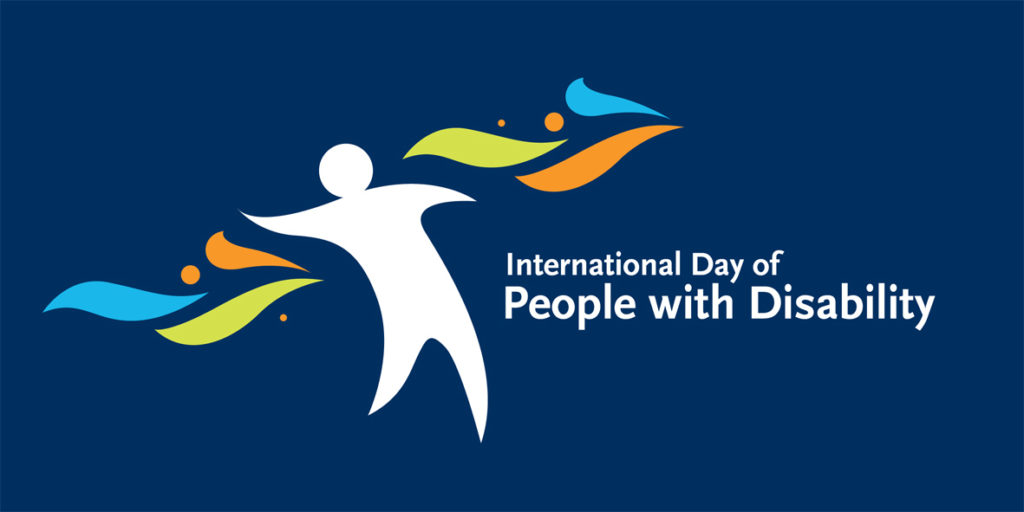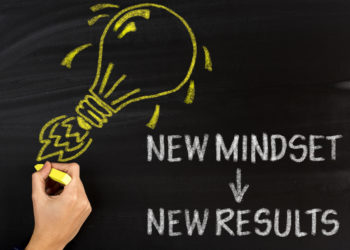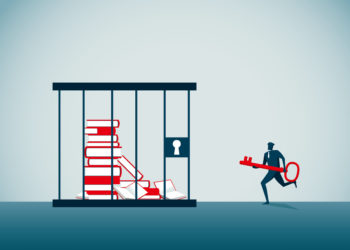Last year, we published two posts (here and here) of testimonies from people of color who work in scholarly publishing about their experiences of racism and of being excluded. We described their testimonies as “powerful and shameful reading for a sector that likes to think of itself as liberal and inclusive.” They were among the most widely read and commented on posts of the year.
Today’s interview tackles another type of exclusion — the lack of acceptance that people with disabilities typically face at work. The interviewees are Katy Alexander (Global Director for Marketing and Communications at Digital Science), Becky Degler (Digital Product Manager at Wiley), and Simon Holt (Senior Acquisitions Editor at Elsevier), who recently co-authored a recent guest post on the topic, as well as a fourth contributor, who is a manager at a large publishing company, and who has asked to remain anonymous. Together, they share their experiences of working in scholarly communications and their thoughts on how we, as a community, could do more to support people with disabilities — for everyone’s benefit.

Could you tell us a bit about your disability, and how this manifests itself at work?
Katy: I’m dyslexic. This means that I have issues with how I process words, thoughts, and numbers, which affects a number of things but mainly my reading and writing. I’m slower at reading, and to be honest it can be exhausting. My emails are usually very short with bullet points, which, if you don’t know me, might come across as curt and unfriendly. Another way dyslexia can manifest itself is with note-taking; I can’t take notes with pen and paper nearly as well as I can with a laptop and, while this might seem like a trivial point, trust me when I say I’ve had managers who have frowned upon this and have requested I use a pen and paper. The results? Well, they weren’t great. Like most dyslexics, I’ve had to adapt, and over the years I’ve developed a LOT of coping mechanisms. Work can definitely be challenging sometimes, and work-related stress can affect the best of us, however, the impact of stress can be worse for people like me. The more stressed or tired we are, the harder it is to compensate for our disability. The key is to stay calm, sleep well, not panic, and more importantly, never be afraid to reach out for help. There is, however, a massive upside to this: dyslexics often have excellent creative thinking skills, which allow us to see a variety of solutions to a problem. Sadly, many companies are still unaware of the positive impact that this disability can have on our jobs, or how a few simple strategies can help us unlock our potential. Coping with dyslexia in the workplace can make a job more challenging, but for me that ultimately makes it more satisfying.
Becky: I have chronic migraine. This means that I am hypersensitive to temperature fluctuations as well as sight, sound, and smell stimuli, which can make an office a hotbed of triggers. Working from home is a lifesaver because I have much greater control over my environment. Typically, even with well-managed triggers, I have a headache on about 20 days every month, and on at least 10 of those days I experience an acute migraine attack. Because medication itself can trigger migraines, I have to abide by strict limits on how much and when to take pain relief. I’ve developed a lot of coping mechanisms to power through and remain productive. Sometimes I have problems with talking because the sound is too much to bear and also because migraine can cause mental confusion that makes communicating difficult. During those times, I much prefer email where I can take my time to find the right words and respond. Unfortunately, there will always be situations when no amount of control management works and I need to put down tools. I will always have a higher rate of absenteeism, but assessing short-term outcomes against long-term wellbeing and productivity has made me an expert at identifying and evaluating risks, which is a valuable skill in the workplace.
Simon: I’m visually impaired. This means that my long-distance vision is very poor, and I’m unable to read presentation slides and printed materials, or figure out peoples’ name badges at conferences. Some tasks, like data entry or analysis, also take me longer. More generally, driving isn’t an option, so I need to plan my travel a bit more in advance. I would say that having a disability has given me lots of things that have proved useful at work, too. It forces me to plan and to be organized with both my time and my activities, to be proactive at introducing myself to people, and to develop efficient workflows that mean I can complete tasks without getting bogged down in the things that take me more time.
Anonymous: I live with manic depression, more commonly known as bipolar disorder. Manic depression is characterized by dramatic shifts in mood, energy, and activity levels that affect a person’s ability to carry out regular tasks, much more severe than the normal ups and downs that are commonly experienced by everyone. Someone with bipolar disorder lives with swapping periods of intense highs (mania) and dark lows (depression). While not a traditional “disability”, mental illness often has a disabling effect and can be quite challenging to manage at work, mostly because of its unpredictability. I simply don’t know how I will feel when I wake up in the morning — I can be exhausted, lethargic, and deeply depressed; or I can feel elated, erratic, powerful, and entirely off the walls. Rarely am I simply even, and truthfully, I still don’t know what a “normal” mood level is for me, but I know that I am constantly working toward some balance to make my life more manageable. At work, I can be productive beyond belief and tremendously confident. My mouse clicks back and forth from draft to draft, I never have less than 30 tabs on open on my browser, and I jump around from task to task like I’m hopping on rocks across a river. I work very fast, often leaving details behind and losing my colleagues who try to keep up while I race through my thoughts. It also means, to my detriment, that I can be impatient and rash and respond emotionally far too often. Most people can count on at least some level of stability and control at their job. Imagine getting through the workday if you couldn’t — when you must sit in a chair for eight hours, when dependability is key, when hazardous impulse is a constant threat to your work. I always feel like I have to work harder to appear “normal” and “stable” to keep my co-workers off the scent of what I’m am really experiencing on the inside.
There are lots of types of disability – both visible and invisible. What has your experience of talking about your disability with your colleagues been like over the years, and has this changed at different points during your career?
Katy: I didn’t tell anyone at work about my disability for years. I’ve hidden it at great cost to myself. It is only recently that I have opened up about it. It is important to understand this: many of us have grown up being told we are stupid by teachers, our peers, and in some cases our families, all because we think and learn differently. I’ve been working for 15+ years and until recently I felt ashamed to be dyslexic, to be different, to be ‘stupid’. I’ll never know if being open about being dyslexic earlier on would have hindered my career, or have made it an easier road to travel, but I have learned two important things. First, most employers and colleagues will not care if you are dyslexic. When it comes down to it, a company is simply concerned about the value a person brings to the workplace; we are commodities. Secondly, some people are just jerks! They hear the word “dyslexic” and believe that you are stupid. While they may have no knowledge of what dyslexia is, they may have very strong views on what they think it means and, therefore, who you are and what you can do. I have found that these types of people will always see me as lacking, no matter how far I get in my career and how much I achieve. Sadly, these biases exist regardless of whether it’s dyslexia or anything else that makes someone different. It certainly isn’t easy when one of these people is your manager. However, while it may sound trite, the lesson I have learned over the years from encountering these people at work is simple: mute them. There is too much to accomplish, and we shouldn’t waste our time or mental energy with jerks.
Becky: Migraine is both visible and invisible. It is noticeable that I miss a few hours or whole days here and there, or when I send emails in the middle of the night because my head has improved enough to work, or when I have to build in quiet downtime when traveling. But it’s also invisible because the reason behind them is not known unless I disclose my disability. Earlier in my life and career, I often tried to hide my migraines. I felt like a failure for not preventing the attack, and weak for being so affected by ‘just’ a headache. I also felt like a burden, even if my colleagues weren’t directly impacted. So I’d take medication discreetly and continue to participate in meetings, even when talking made things worse and I was so dizzy I felt like I’d pass out mid-sentence. But that’s the fast track to burn-out and it doesn’t actually make anything better for anyone. It also breeds distrust. Now, I am much more open about my illness. For the most part, this has markedly improved my experience at work. Openness makes me less unpredictable to my colleagues, allows me to plan better to mitigate impacts, and helps engage many stakeholders to tackle all sorts of problems together. Everyone has limitations of one kind or another, and knowing each other’s strengths and weaknesses makes teams more effective. It also helps open a dialogue and increases awareness that migraine is much more than a bad headache. Of course, making my disability visible is not without its problems. I’m now much more at risk of unconscious bias. I am also forced to be somewhat uncomfortably transparent about my personal medical condition. Some people don’t want to know at all, some want to know a great deal more, and some see it as an invitation for suggestions on how to treat my migraine. While I’m confident that my GP and neurologist are on their game and don’t really need to know what worked for your neighbor’s great aunt, I’d still much rather have those conversations repeatedly than go back into hiding!
Simon Yes, I think this has changed during my career, but unfortunately this hasn’t always been for the positive. At the start of my career, I would get questions like ‘Does visual impairment mean you can’t read, then?’, but now what I find is that people don’t ask at all, because they don’t want to offend, and instead just assume that you can’t do whatever task it is. This can be frustrating both for me and for them, as I’m guessing most people would like to ask but are not always sure how! I find open-ended questions like ‘How would you approach x task?’ are helpful ways of broaching the subject for all concerned. More generally, however, I would say that diversity of all types is more encouraged at work now than it was 15 years ago, and I feel more comfortable being open about/talking about my disability now than I did at the start of my career. Part of that is that I’m more confident about my own abilities, but part of it is also that societal shifts mean that companies are more aware of not only the challenges faced by people with disabilities, but also of the skills we possess,and the need to actively integrate them into their workforces.
Anonymous: Out of fear of being judged and stigmatized, I have told very few people I work with about my illness. I have a few colleagues, who are more than just colleagues — they are dear friends — that I’ve shared my experience with. They have been indispensable to me and my health. They are there for me when I need a break, need someone to listen, and, because of the nature of my illness, calm me down.
One of the most challenging points in my career was when I decided to disclose my illness to my manager. I felt a little fear when telling my family and close friends, but I was very quickly put at ease and rewarded for doing so. I knew they would appreciate it for what it was, sympathize, forgive my past actions, love me anyway. Many loved me more and better, for finally having a framework with which to understand me. But to tell someone who plays a huge role in my career success was another story. Knowing her as well as I do, I knew she would be absolutely lovely about it — her character only suggested that she would be nothing but kind and understanding. But it was terrifying to disclose such a stigmatized illness like bipolar disorder — one that is so misunderstood, unpredictable, and occasionally dangerous — to someone who is evaluating my work. Would every decision I made be questioned? Would I accidentally lose my cool over something? Would all my mistakes be attributed to my illness? Would I be seen as unreliable, erratic, too emotional to be trusted with important work? I was very nervous about having that conversation. I read article after article about whether or not to disclose a mental illness to your boss. Why, why not? How? But because there was a legitimate reason for the impact on my work (that was often out of my control), I ultimately went from feeling like I should tell her, to feeling like I had to tell her. And it was the best decision I could have made. She was more than understanding, sympathetic, and grateful. She has not treated me differently and has been completely supportive of all my needs. I believe I have thrived and survived professionally because of her. She may not realize how much she has done for my well-being. She has been my cheerleader and champion.
What do you feel individuals could do to be more inclusive of people with disabilities at work?
Katy: It all starts with perceptions. Perceptions need to change. We need to start thinking and understanding how our differences make us stronger, and ultimately improve the quality of our outputs. Diversity isn’t just a box to tick; it can bring huge benefits to teams, companies, and working environments. I’m very fortunate at the moment. I currently manage the most fantastic team. We have a very collaborative approach to work. We all are able to recognize our strengths and weaknesses, and this means that as a team we bring different strengths, skill sets, and experiences to the table. I have been open with them from the start about how dyslexia may impact my work but how, with the right tools and techniques, we dyslexics can master any given task. To their credit, they have adopted tools like Trello without a grumble, and I couldn’t ask for a better, more open group of people to work with.
Becky: Flexible communication styles can really help. Remote working changes the dynamic of conversations. You’re no longer just part of the conversation by virtue of being in the same vicinity, you need to be actively brought into it; but this is often after the fact and sometimes not at all. This can create division and exacerbate perceptions of difference. A simple thing that peers can do is to reach out to remote workers, not only for meetings, but also for quick check-ins. This builds stronger communication skills for everyone, which are essential to pretty much any workplace. For managers, learning a bit about the disability(ies) of your employee can make a huge difference. Having a baseline understanding of what challenges your employee is facing can help you be a more empathetic manager and also help you bring out your employee’s best work. I like to share the Spoon Theory because it helps managers and employees with chronic illnesses find a common language and understanding.
Simon: Small things make a big difference. Ask people what they need — not in a patronising way, but just in a straightforward, peer kind of way. Don’t assume you know what challenges someone faces, or what they might need, because everyone is different, even if they have the same category of disability. Personally, I would always prefer people to confront the elephant in the room and ask me about my vision, but I also accept that everyone is different, so remembering that each person has their own approach is important.
Anonymous: I wish people would be more careful about their language and word choice. One of the most triggering things for me is when someone says “bipolar” as a euphemism for “crazy” or “angry” (it happens a lot). People throw around the term carelessly when describing someone’s behavior as odd or moody, or plainly when they think someone is “acting crazy”. When I hear bipolar used as a lay term, it minimizes the gravity of my pain and associates it with negative, unlikable, and uncomfortable behavior. As a result, I think that I must be crazy and unlikable, which can often spin me further into depression.
Are there things you feel companies could be doing to improve their inclusion of people with disabilities?
Katy: There are a lot of easy, non-expensive things companies can do — using special fonts, allowing the employee to work from home where they will be able to concentrate on their work, and allowing us to utilize available technologies, where required, are just some simple examples. However, I think the most important hurdle is the first one; the hiring process. Hiring managers and HR need to be aware of how they hire and what biases they may have. Take one example, which has happened to me a number of times. At interview, don’t give candidates “tests” with no warning — it just isn’t inclusive. I don’t care what the job role is. It isn’t necessary for assessing whether a candidate is a “good fit”. Be sure to allow extra time, or let people do the test at home with the software and time they might need. Dyslexic employees could be some of your smartest, most imaginative, and highly motivated employees. Instead of penalizing us for our perceived deficiencies, make the most of our talents.
Becky: Absolutely. In addition to what Simon and Katy mention, one of the critical elements in my experience is whether or not there are role models and ambassadors in the organization. My path from hiding to owning my disability shifted dramatically when I learned that a member of the executive team also had personal experience with chronic migraine. It eventually passed, but I don’t think that person ever knew how much of a difference it made to me for the condition to be visible and not embarrassing. More broadly speaking, I think companies have a responsibility to train the trainers. Educate your human resource teams about the benefits people with disabilities bring to an organization, so that they can develop sensitive policies and employee training. Operationalize how you treat and manage employees with disabilities, e.g., create transparent processes for submitting and evaluating reasonable accommodation requests, update your sick leave policies to ensure they’re not discriminatory, provide training for managers on how, when, and what to communicate to colleagues. I’m also a huge fan of unconscious bias training for all.
Simon: Definitely. It’s about creating an infrastructure where people can succeed. That means everything from the moment someone reads an advert for a job, through the application process, hiring, their first day, onboarding, and then through their progression within the company. There are lots of things to consider, but the main ones I would say involve a) explicitly saying in your job advert that you welcome applications from people with disabilities, b) giving managers the support they need to hire and manage someone with a disability without lots of extra work on their part, and c) prioritizing outputs over ‘cultural fit’ — particularly in terms of ‘ways of working’. Flexible working is important here, but also recognizing that different people have different working styles.
Anonymous: I would like to see companies do a better job of catering to the needs of those suffering from mental illness. Flexible hours are really key to this — many of us have multiple doctor’s appointments (weekly therapy, monthly psychiatrist visits, on top of more frequent primary care appointments). There are also days when getting out of bed seems insurmountable. Having the flexibility to take the time you need or to work from home when you’re not fit to be around people can do a lot for a person’s well-being. When we’re not doing well internally and emotionally, we can’t do well at work. Companies should also make sure their benefits packages include insurance coverage for mental illness.
Could you give some examples of companies or industries that are leading the way in this sense?
Katy:
- Microsoft and NASA actively encourage applications from neurodiverse candidates. Why? In the case of dyslexics, we are deliberately sought after because we have superb problem-solving skills and pattern recognition skills. This may be down to the differences in our visual abilities [source: Scientific American]
- The British intelligence agency uses our ability to analyze complex information and employs a number of dyslexic and dyspraxic employees. We are sought out for our skills at deciphering facts from patterns or events and seeing the many different ramifications from a scenario
Simon: The tech industry is one we should be looking to for inspiration here. Many publishers are increasingly focusing on their technology divisions, with an emphasis on information and analytics. Microsoft and IBM both have best-in-class inclusive recruitment and people development policies, which have allowed them to develop disability inclusive workforces. I feel the publishing industry is just at the start of our journey in this respect, and we should seek to use the relationships we have with tech companies to learn from the work they have already done, so we can increase the inclusivity of our own workforces. At Elsevier, we have taken some important steps by hiring a full-time Head of Inclusion and Diversity in January 2019, but as an industry I think we are really in the early stages of our collective journey.
Finally, how do you think scholarly communications industry could work together to be more inclusive of people with disabilities?
Katy: I’m hopeful that the industry will start to adopt novel tech more widely, to break down barriers to accessing this profession, and for the culture to shift to better understand the benefits that a more diverse workforce can bring.
Simon: I think it’s really important to work on an industry-wise basis regarding this. Diversity and inclusion is not a competitive sport, and certainly not when it comes to widening access to the industry to be more inclusive of people with disabilities. It is also important to note that the publishing industry includes companies of all sizes, and some people might find themselves the only people with disabilities at their companies. It is therefore important to try and work together, so individuals are empowered to make their own companies more disability friendly. In this way, we become more disability confident as an industry, as opposed to just selected individual companies.
To this end, we are currently exploring the possibility of starting a Publishing Industry Disability Working Group. If you are interested in finding out more, please email me: s.holt.1@elsevier.com
Discussion
3 Thoughts on "On Being Accepted: The Views of Four People with Disabilities Working in Scholarly Communications"
Thank you all for sharing your experiences and making us all more mindful of our interactions with colleagues of all abilities. I was reminded of climate activist Greta Thunberg who calls her Aspergers her superpower. You all did a nice job of highlighting the talents you have because of your disabilities or challenges while also reminding us of things we could do differently to ensure that our work environments are inclusive.
Heartfelt appreciation for shedding light on this important and oft-hidden topic of differently-abled professionals and what they bring to the academic and scholarly community. The strengths presented by neurodiversity (thank you for that empowering term of respect!) remain grossly devalued and stigmatized by colleagues and administrators, perhaps out of fear that any smart and capable person could lose their “ability” at any time. That sense of vulnerability seems to fuel excruciatingly painful prejudice and unkindness. We are better than that!
Thank you all for speaking up, sharing your experiences and highlighting these important hidden challenges. In my mind, you are all amazing industry role models, pioneers, and true leaders!! I hope we can find more ways to support you and the Publishing Industry Disability Working Group.
One thing that springs to mind, I recently went to a dyslexia simulation event run by a branch of the International Dyslexia Association, very eye opening (more details here https://pa.dyslexiaida.org/what-we-do/simulations/) I wonder if there are more useful resources like this, that we as an industry and the hiring/line managers might consider using. I also agree with Katy’s comments that there are so many positive traits of people with neurodiverse backgrounds, spending more time highlighting and understanding these can also help with the stigma, one only has to look at people like Albert Einstein, Richard Branson, Steven Spielberg, Erin Brockovich, Dr Carol Greider (Nobel Prize in Medicin) who are known to have neurodiverse backgrounds, the list goes on btw, just take time to look, search and learn! … thank you again Alice, Katy, Simon, Becky and anonymous



